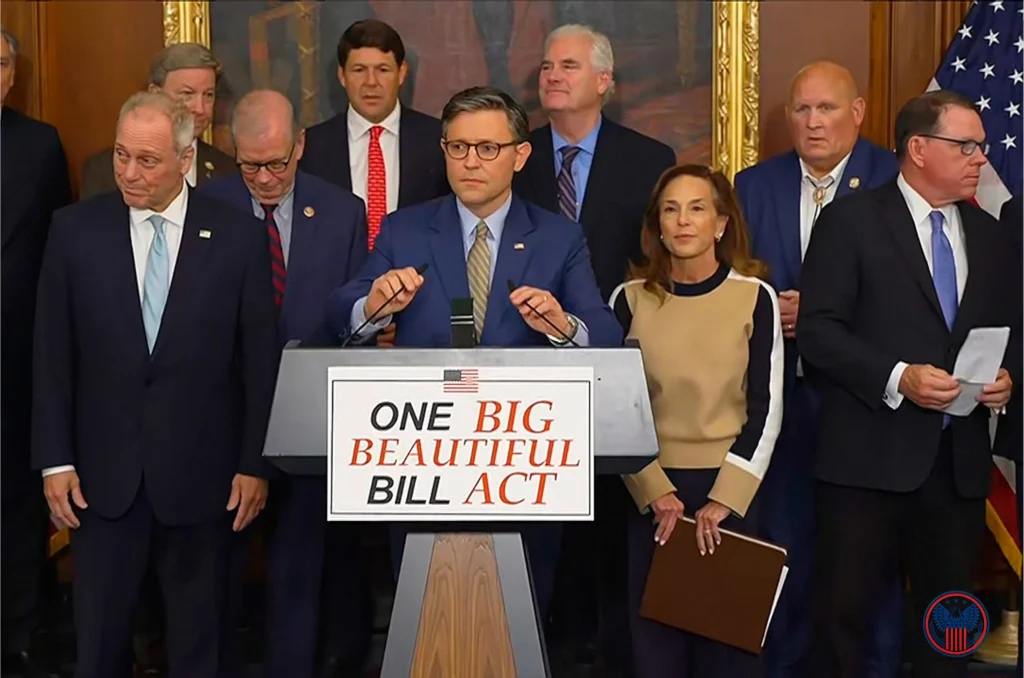Senate GOP Pushes Trump’s “Big Beautiful Bill” Toward Monday Showdown After Chaotic All-Nighter
WASHINGTON—In a dramatic Saturday night vote that stretched past midnight, Senate Republicans narrowly advanced President Donald Trump’s sweeping domestic policy package, setting the stage for a high-stakes final passage vote Monday—but not before clerks spent 15 hours reading all 940 pages aloud at Democrats’ insistence. The 51-49 procedural vote masked deep Republican fractures over Medicaid cuts, deficit spending, and eleventh-hour deals that barely salvaged Trump’s July 4 deadline promise.

The Midnight Gamble
Vice President JD Vance raced to the Capitol as voting stretched into its third hour, ready to break a tie. GOP leaders huddled frantically with holdouts Ron Johnson (R-WI), Mike Lee (R-UT), Rick Scott (R-FL), and Cynthia Lummis (R-WY), whose bloc initially opposed the bill over its $5 trillion debt ceiling hike and “insufficient” spending cuts. Johnson flipped to “yes” only after securing a pledge for amendment votes to gut Obamacare’s Medicaid expansion—ending 90% federal cost-sharing for new enrollees. “The president’s confident the House will accept our changes,” Johnson told reporters, though he refused to guarantee support for final passage.
Senators Thom Tillis (R-NC) and Rand Paul (R-KY) stood firm against the bill. Tillis warned the Medicaid provider tax cap would cost North Carolina $38.9 billion, forcing “painful decisions like eliminating coverage for hundreds of thousands.” Paul called the debt increase “fiscally irresponsible” 13. Trump lashed out hours later on Truth Social “Thom Tillis is making a BIG MISTAKE… What’s wrong with Rand Paul???”.
What’s in the Megabill?
The $4 trillion package—Republicans’ largest legislative push since Trump’s 2017 tax cuts—combines economic carrots with conservative policy shifts:
- Tax Cuts: Permanently extends Trump-era rates, expands the Child Tax Credit to $2,200 per child, and allows tip and overtime income deductions (up to $25,000 and $12,500 respectively).
- Border Funding: $46.5 billion for border wall construction, plus $15 billion for surveillance tech and facilities.
- Medicaid Overhaul: Imposes 80-hour/month work requirements for “able-bodied” adults under 65 and caps state provider taxes—a move critics say threatens rural hospitals. A last-minute $25 billion “rescue fund” for those hospitals won over Sen. Josh Hawley (R-MO).
- SALT Deduction: A compromise raises the cap to $40,000 for married couples through 2028—a win for blue-state House Republicans.
- Student Loans: Replaces Biden’s SAVE plan with a standardized repayment system and caps parent/graduate borrowing.
The bill’s cost drew fire from Elon Musk, who slammed its energy provisions as “utter madness” and “political suicide”
The Parliamentarian’s Guillotine
Much of the drama traces to Senate Parliamentarian Elizabeth MacDonough, who axed $250 billion in planned savings by ruling key Medicaid and SNAP cuts violated the Byrd Rule—requiring provisions to directly impact the budget, not merely set policy. Her rejection of stricter work requirements for food stamps and bans on noncitizen Medicaid access forced Republicans to scramble for alternatives.
“It’s pretty frustrating,” conceded Sen. Rick Scott, though GOP leaders ruled out overruling MacDonough despite pressure from conservatives. Democrats cheered the rulings. “We struck health care cuts that would hurt Americans walking an economic tightrope,” said Sen. Ron Wyden (D-OR).
GOP Civil Wars
Even with the bill advanced, Republicans face landmines:
- Medicaid Mutiny: Sens. Susan Collins (R-ME) and Tillis vow to demand amendments or oppose final passage. Collins called the hospital fund “inadequate,” warning closures could “devastate rural communities”.
- AI Regulation Freeze: Sen. Marsha Blackburn (R-TN) will push to strike a 10-year ban on state-level AI rules, calling it “anti-innovation”.
- Debt Dilemma: Paul’s opposition to the $5 trillion debt ceiling hike highlights concerns over a CBO-estimated $4 trillion deficit increase.
Democrats plan to weaponize the upcoming “vote-a-rama”—a marathon amendment session—to force tough votes. “Republicans are scrambling to pass a radical bill in the dead of night,” said Minority Leader Chuck Schumer, who ordered the full bill reading to spotlight “unpopular provisions”
The House’s Razor Edge
Final Senate passage now hinges on a grueling timeline:
- Debate: 20 hours split between parties (Democrats will use nearly all).
- Vote-a-rama: Unlimited amendments starting Sunday.
- Final Vote: Likely Monday afternoon.
Then the bill heads to the House, where Speaker Mike Johnson’s two-vote margin leaves zero room for error. Medicaid cuts already face resistance from Reps. David Valadao (R-CA) and Jeff Van Drew (R-NJ), who called the Senate version a retreat from their “sweet spot” deal.
Human Toll Behind the Numbers
For North Carolina families like Marissa Lopez, whose disabled son relies on Medicaid, the bill’s provider tax cap could mean life-or-death cuts. “Our hospital already struggles,” she told CNN. “If they close, where do we go?”.
Tillis cited such stories in his defiant “no” vote: “This isn’t abstract—it’s people’s livelihoods”
The Senate reconvenes Sunday for debate and amendments. If passed Monday, the House could vote as early as Tuesday—but Johnson warned members not to “post on X” until text is final. Trump’s July 4 deadline hangs by a thread.








